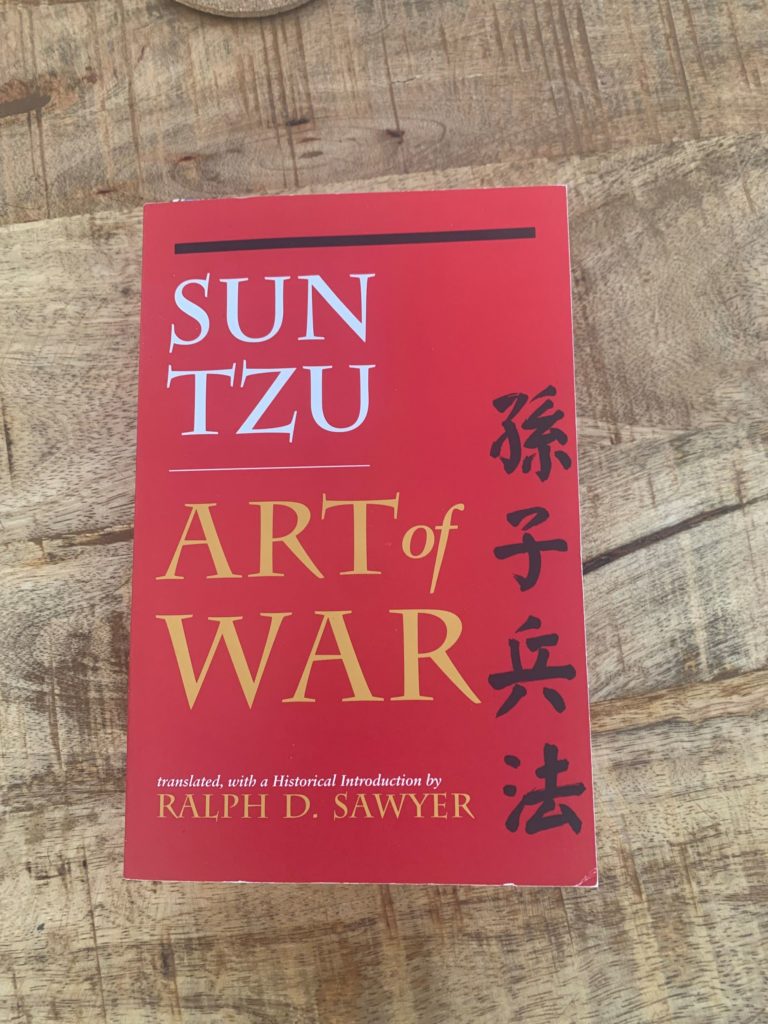There is no mystery here, the title of the chapter is actually what it is about. Some translations call it Army on the March or something of the like. At least in my translation, I would say that it is a little more than marching but what to do on the encountered terrain is included. At least this chapter is not a complete mystery.

Once again, I would say that the advice is pretty common sense (at least I thing so). It is such things like, if you are in swamp do whatever you can to get out of the swamp or try to pick the higher ground for encampment. It also offers some intuitive advice like if you end up fighting in a swamp, move to end it quickly or get out of the swamp. Or in other words ‘don’t get bogged down’ do what you can to stay in strategic advantage.
There is also some tactical tips in this chapter. Some examples include frothy stream water means that it is raining upstream. Certain dust cloud formations indicate chariot direction and army composition. I would say that this kind of advice is not terribly practical at this point in history. We don’t have too many chariot armies to deal with. It is possible that tanks make different clouds than trucks, I just don’t know. Reading Sun Tzu, I can only comment on what is written.
It doesn’t mean that this line of thinking is totally devoid of value, we just have sift through the non-applicable to the applicable. For instance when I am in the woods, it is often the case that when we humans (me) blunder into the area, animals are disturbed. As long as you sit very still, things will start coming back to normal (before blundering in the woods). I take from it that humans interact with the environment. Knowing the impact of our interaction gives us a strategic advantage over those that do not.
Since playing army and tactics are not super relevant to most of us, there is probably something else that we can get out of this chapter. It reminds me of a saying that is common in self defense circles. ‘Don’t go to stupid places with stupid people and do stupid things’. What that means is that if we knew the future, smart people would not get into trouble.
Said another way, if you knew that going to a certain location was going to get you mugged, a smart person wouldn’t go. We can have all the bravado about concealed carry and BS but wouldn’t it just be better to not be there in the first place? I think so. So, if you are getting the sense that a situation might be trouble, this is your first indication to avoid it. Speaking of which, I would avoid downtown of major cities just after the election Tuesday night.
Using an example from the recent news, Kyle Whittingham. He went to a riot with a rifle under the auspices of protecting a friend’s property. Stuff went sideways and fortunately for him, he got out unharmed physically. But, it sure doesn’t mean that he didn’t have consequences. After having to stand trial and being exonerated, he is now somewhat of a social pariah. When you have to stand and fight, I get it. But that is going to stupid places. I suspect that he wishes he would have just stayed home.
What I think Sun Tzu is saying is that he willingly went into the swamp. Then a fight started. Whittingham fortunately followed Sun Tzu’s advice and got out of the swamp quickly, hence he is still with us. March through the swamp as fast as possible, if absolutely necessary.
End Your Programming Routine: I have to say that it is refreshing to not have to read a lot of other’s interpretations to understand what is the point of the chapter. That is giving me flashbacks to Dante. It is just that I am not versed in eastern philosophy so I don’t recognize what is happening even when it is hitting me in the face. Machismo of the past might call my advice cowardly. But, you never know who is bringing a gun to a fist fight. There is a pretty good chance that I will.
Recent Comments